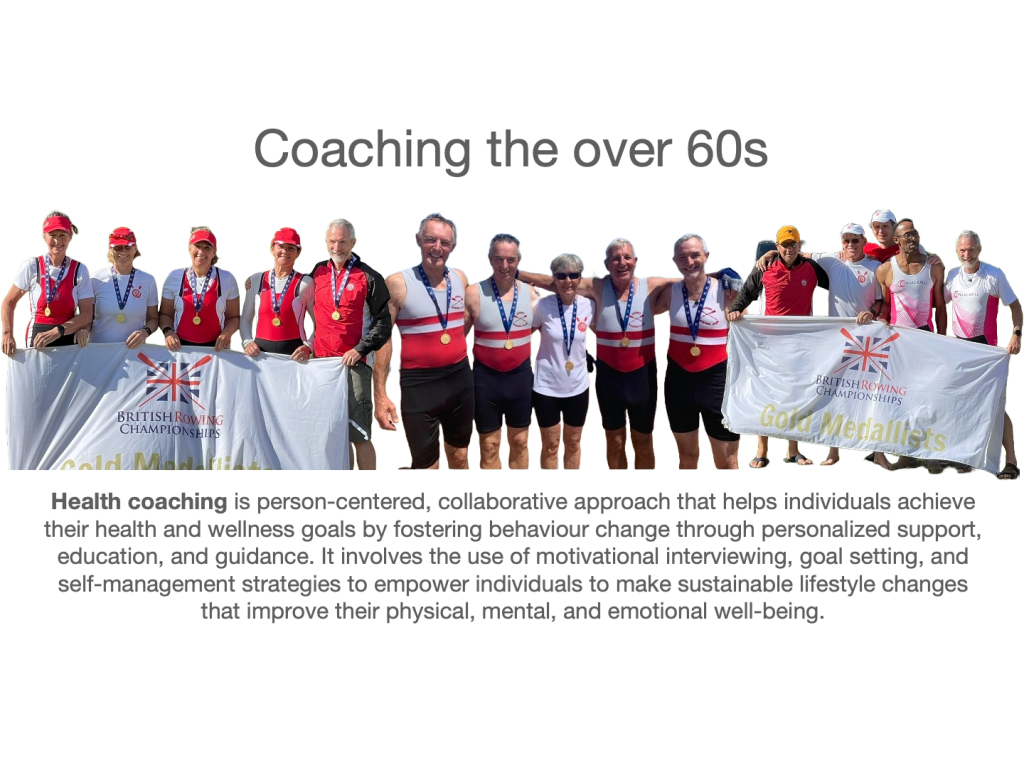Health Coaching:

Health coaching is a person-centered, collaborative approach that helps individuals achieve their health and wellness goals by fostering behavior change through personalized support, education, and guidance. It involves the use of motivational interviewing, goal setting, and self-management strategies to empower individuals to make sustainable lifestyle changes that improve their physical, mental, and emotional well-being.
Key Aspects of Health Coaching:
1. Person-Centered and Personalized: Health coaching is tailored to the unique needs, preferences, and circumstances of each individual. Coaches work closely with clients to set realistic, personalized health goals, whether that’s related to managing chronic conditions, improving fitness, enhancing mental health, or addressing lifestyle issues like nutrition or smoking cessation.
2. Empowerment and Self-Management: Health coaching empowers individuals to take an active role in their own health care. This may involve teaching clients how to manage chronic illnesses, navigate healthcare systems, or adopt healthier habits. A core tenet is fostering self-efficacy, where individuals gain confidence in their ability to make and sustain positive health choices.
3. Behavioral Change Focus: Health coaching employs evidence-based techniques from psychology, such as motivational interviewing and cognitive-behavioral therapy (CBT), to help individuals overcome barriers to change. Coaches support clients in identifying obstacles, building motivation, and developing strategies for long-term behavior change.
4. Holistic Well-being: Health coaching considers the whole person, including physical, mental, and emotional health. This means addressing issues beyond the physical, such as stress management, emotional resilience, social connections, and mental health, all of which are integral to overall well-being.
5. Blended Delivery Approaches: Health coaching can be delivered through a variety of methods, including in-person sessions, phone calls, video conferencing (like FaceTime or Zoom), or a blended approach that combines these methods. This flexibility allows coaches to meet the needs of clients with varying levels of mobility, access, and comfort with technology.
6. Accountability and Support: Regular check-ins and ongoing support are critical components of health coaching. Coaches serve as accountability partners, helping clients stay on track with their goals and providing encouragement, feedback, and adjustments to the plan as needed.
Academic and Professional References Supporting Health Coaching:
1. Wolever et al. (2011) define health coaching as a process that facilitates healthy, sustainable behavior change by challenging clients to develop their inner wisdom, identify their values, and transform their goals into action.
2. Sforzo et al. (2017) highlight that health coaching is an established, evidence-based method that leverages cognitive-behavioral techniques, motivational interviewing, and goal-setting to promote health behavior change.
3. Simmons & Wolever (2013) describe health coaching as a structured partnership that helps individuals adhere to healthy lifestyles and behavior changes, particularly for chronic disease management.
4. The International Consortium for Health & Wellness Coaching (ICHWC) emphasizes that health coaches facilitate healing and wellness by addressing the root causes of disease and helping clients engage in self-care behaviors that promote optimal health.
5. The National Board for Health and Wellness Coaching (NBHWC) describes health coaching as a process of working with clients to enhance their well-being by providing individualized, evidence-based guidance on improving lifestyle habits, such as exercise, nutrition, stress management, and sleep.
Application in the Over-60 Population:
Health coaching is especially beneficial for older adults as it addresses issues such as chronic conditions, loneliness, mental health challenges, and physical fitness, which are prevalent in this demographic. For example, coaches can help older adults adopt exercise routines to address the statistic that fewer than half of adults over 65 meet minimum activity guidelines, or provide support in managing mental health conditions like anxiety or depression, which are more common among those with longstanding illnesses.
Health coaching also tackles the social determinants of health, which are increasingly relevant for older populations dealing with isolation or limited access to resources.
Conclusion:
In summary, health coaching is a collaborative, individualized approach to health promotion and behavior change that helps individuals, especially those in older populations, manage their health more effectively. It combines clinical knowledge with psychological tools to address the full spectrum of wellness, from physical health to emotional resilience and social well-being.
